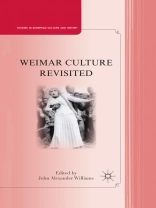Weimar Culture Revisited is the first book to offer an accessible cross-section of new cultural history approaches to the Weimar Republic. This collection uses an interdisciplinary approach and focuses on the everyday workings of Weimar culture to explain the impact and meaning of culture for German’s everyday lives during this fateful era.
Содержание
Revolution and the Weimar Avant-Garde: Contesting the Politics of Art, 1919-1924; D.Lewer Cinema, Radio, and ‘Mass Culture’ in the Weimar Republic: Between Shared Experience and Social Division; C.Ross Blue Angel, Brown Culture: The Politics of Film Reception in Göttingen; D.Imhoof Middle-Class Heroes: Anti-Nationalism in the Popular Adventure Films of the Weimar Republic; O.Ashkenazi Exotic Attractions and Imperialist Fantasies in Weimar Youth Literature; L.Springman How Can a War Be Holy? Weimar Attitudes Toward Eastern Spirituality; T.Neuhaus Visualizing the Republic: State Representation and Public Ritual in Weimar Germany; N.Rossol The Party Does Indeed Fight Like a Man: The Construction of a Masculine Ideal in the Weimar Communist Party; S.A.Sewell Sweat Equity: Sports and the Self-Made German; E.Jensen Friends of Nature: The Culture of Working-Class Hiking; J.A.Williams
Об авторе
Ofer Ashkenazi, Hebrew University, Israel David Imhoof, Susquehanna University, USA Erik Jensen, Miami University of Ohio, USA Debbie Lewer, University of Glasgow, UK Tom Neuhaus, University of Derby, UK Corey Ross, University of Birmingham, UK Nadine Rossol, University of Essex, UK Sara Ann Sewell, Virginia Wesleyan College, USA Luke Springman, Bloomsburg College, USA John A. Williams is Professor of History at Bradley University, USA.












